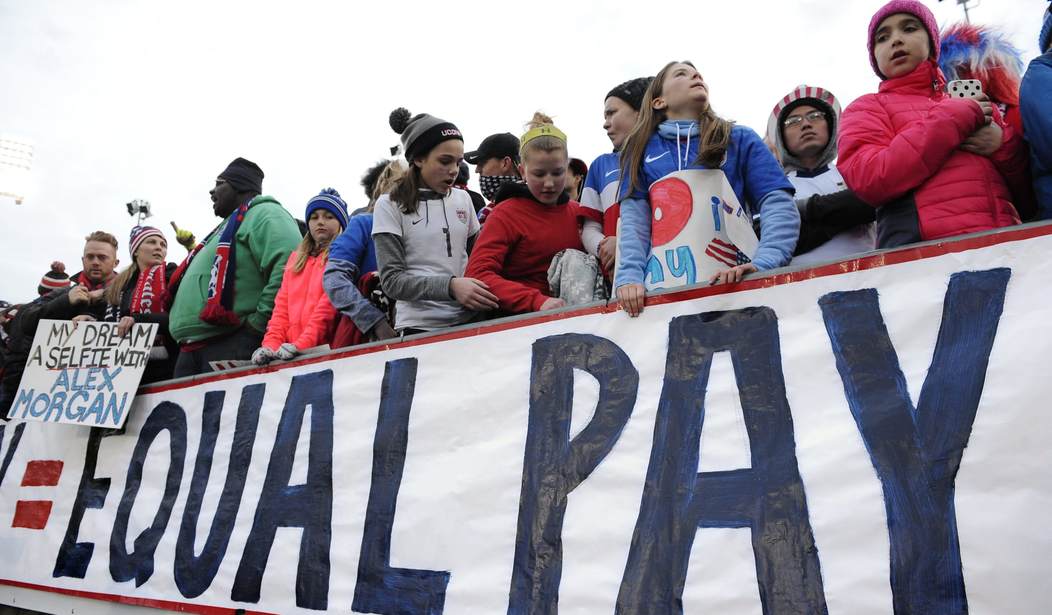Utah state Sen. Jake Anderegg (R) decided it was time to find out just how wide the gap was in his state between what men and women are paid for equivalent work.
It’s not that he wants new regulations to force equal pay for equal work, but Anderegg at least wants to see the dollars-and-cents of the wage gap in Utah.
“We’re not willing to look at that?” Anderegg told the Christian Science Monitor. “It’s kind of like we’re burying our heads in the sand and pretending like the wage gap doesn’t exist, or that we’re not being sexist or discriminatory.”
So, being one willing to pull his head out of the sand, Anderegg sponsored Senate Bill 210 to mandate a state-paid study of the wage gap between the sexes in Utah.
Wasatch County, Utah, Republican Party Co-Chairman James Green was on board with the “head out of the sand” theme.
Green wrote a letter to the editors of his hometown paper, the Wasatch Wave, and the Park Record in which he blasted Anderegg’s proposal and also lacerated the idea of equal pay for equal work.
“Traditionally men have earned more than women in the workplace because they are considered the primary breadwinners for families. They need to make enough to support their families and allow the Mother to remain in the home to raise and nurture the children,” Green wrote.
“If businesses are forced to pay women the same as male earnings, that means they will have to reduce the pay for the men they employ, simple economics,” Green concluded. “If that happens, then men will have an even more difficult time earning enough to support their families, which will mean more Mothers will be forced to leave the home (where they may prefer to be) to join the workforce to make up the difference.”
Green wrote that if more women were forced into the workplace, that would make it even tougher for men to find work at a wage that could support a family.
“It’s a vicious cycle that only gets worse the more equality of pay is forced upon us,” Green wrote. “It’s a situation of well-meaning intentions, but negative unintended consequences.”
The next day, Green was apologizing.
He sent an email to Fox 13 in Salt Lake City in which Green admitted he had been in “hot water” because of his letter.
Green followed that with a letter of apology.
Green wrote in his second letter that he was only trying to say that government shouldn’t tell businesses how much to pay their employees.
“There was no offense intended toward Women, whatsoever. And yet some took it that way. To those who were offended, I profusely apologize. I sincerely did not mean to do that,” Green wrote.
“Of course, women’s contributions in the workplace are just as valuable as any one else’s. I was merely pointing out the historical reasons for pay disparity and the challenges of overcoming that,” he added.
That wasn’t good enough. Even though Green stated in the opening paragraph of his apology that his views didn’t reflect the views of the Wasatch County Republican Party, the local GOP chapter wanted to make that crystal clear.
“I am shocked and appalled to learn how James Green feels about equal pay for women,” Rep. Tim Quinn (R) said in a statement. “I don’t know where this belief came from.”
Green resigned before the end of the week.
Adding irony to the wound, Sen. Anderegg said that not only did he not agree with Green’s opinion, he also criticized his fellow Republican for not reading, or at least understanding, the intent of SB 210.
The proposal, Anderegg stressed, does not call for government-mandated equal pay. He told the Salt Lake Tribune his bill merely calls for an investigation of hard data to get away from relying too much on anecdotal information.
“Good data is going to drive the issue with my conservative colleagues,” he said. “We need to have Utah numbers, Utah data and put the question to bed. Then we can address it.”
The whole thing might die in committee, though.
The Senate Business and Labor Committee decided March 3 that Anderegg’s proposal to conduct a study on wage equity needed, well, more study.
Anderegg told the Daily Herald that the Utah Department of Workforce Services doesn’t have all the numbers needing to be crunched to come to a definite conclusion on the size of the wage equity gap.
“I would love to move forward with this,” Anderegg said. “However, because I’m a data guy, I fully acknowledge that this current bill and this study being requested in its current form will likely be inadequate.”









Join the conversation as a VIP Member